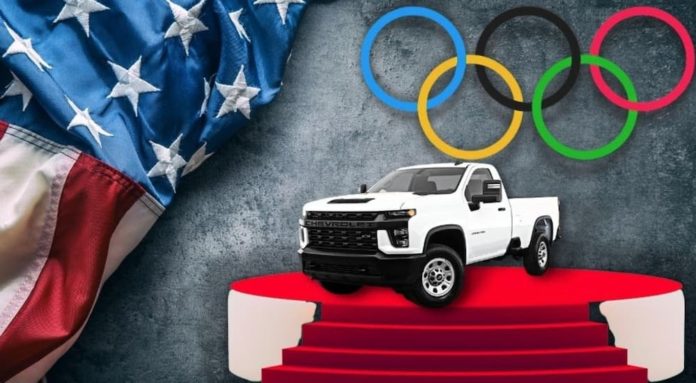The United States Olympic Committee has announced a creative new way to address concerns around the viral transmission of Covid-19 at this summer’s Tokyo Olympics. Ignoring calls to boycott the games altogether, the USOC is partnering with a local Chevy Silverado HD dealer to ensure that U.S. athletes can go for the gold on the world’s biggest stage without endangering their health.
The 2021 Chevy Silverado 3500 HD Olympics Edition is a limited-run trim package designed specifically for the 600-plus U.S. athletes expected to compete in the 2021 summer games, which were postponed last year due to the Covid-19 outbreak. By leveraging the Silverado 3500’s heavy-duty construction, Team U.S.A. hopes to limit transmission by having all its athletes compete from inside the heavy-duty truck’s spacious cabin. With 44.5 inches of front legroom and shoulder room of over 66 inches, the 3500 HD’s ample interior will allow every gold medal hopeful to put years of training into use while remaining hermetically sealed against possible infection.
“I’ve been loving it so far. Usually I start to get really overheated about 1/3 of the way through the 26.2 miles, but with the Silverado’s air conditioning and ventilated front seats, I never even broke a sweat,” says U.S. women’s marathoner Shiner Small. “I guess it also helps that I didn’t actually have to run at all,” she adds.
While virologists and public health experts laud Team U.S.A.’s pragmatic approach to athlete safety, some critics worry that the Silverado might give some competitors an unfair advantage. The truck’s class-leading towing rating of 36,000 pounds, for example, could see the U.S. earn it’s first-ever gold in men’s rugby, as any competing national team would struggle to stop the Chevy as it steamed in for a try.
The Silverado’s imposing frame will give U.S. athletes another advantage in Tokyo: at nearly 12-feet-wide and 20-feet-long, their rivals are sure to give this behemoth of a truck a considerable berth on the track, court, or field. “While I applaud the U.S.’s effort to contain the transmission of Covid-19, I take issue with the unfair advantage this solution gives to their athletes,” says Jan Baumann, assistant coach of the Swedish women’s soccer team. “We haven’t even played against Team U.S.A. yet, but after their first game against Brazil, the field was such a rutted, muddy mess that we had to postpone our next match for two days.”
The Silverado has wreaked particular havoc on the game’s track and field events, with a number of national team coaches pointing to the world records being broken left and right as ample proof of the U.S.’s advantage. In one particularly galling incident, the long-held men’s javelin record of 98.4 meters was decimated by a U.S. thrower who launched his own spear a record-smashing 149 meters thanks to the 3500 HD’s 464 pound-feet of torque.
Other national team coaches are more than happy with the U.S.’s overly cautious approach. “I think it’s a great idea,” Xaiofan Liang, a physical therapist with the Chinese women’s swim team. “We had been predicted to place second in the women’s 200m freestyle this year, but after the favored U.S. swimmer immediately sank to the bottom, we were able to easily take the gold,” says Liang.
The truck’s last-minute inclusion led to some theatrics during the game’s opening ceremonies, which quickly took on the tenor of a monster truck rally as the herd of Silverados paraded through Tokyo’s brand-new Olympic Stadium. Other country’s delegations quicked their pace as the procession of heavy-duty trucks impatiently revved behind them, leading to a record-setting ceremony of just 12 minutes.
“I thought we handled it well, though in retrospect we might have gone a bit overboard with the custom paint jobs,” says Stuart Doris, PR director for Team U.S.A., while standing in front of Silverado featuring an airbrushed mural of a loincloth-clad Ryan Lochte battling a dragon with a flaming sword.












